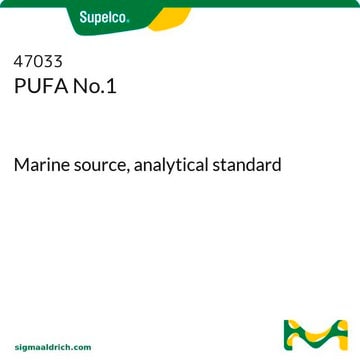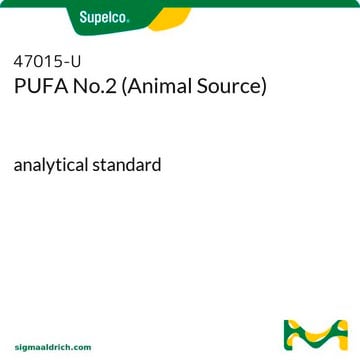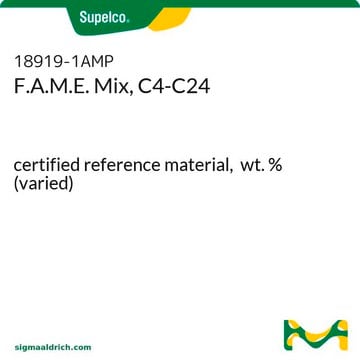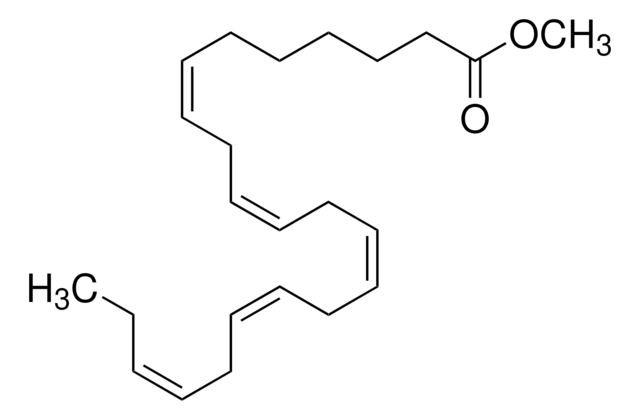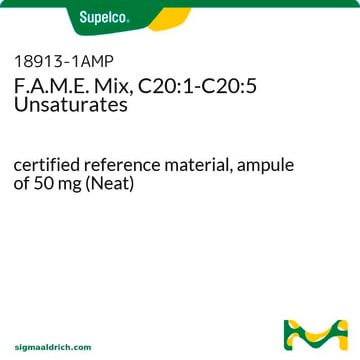47085-U
PUFA No.3
From Menhaden Oil, analytical standard
Sinónimos:
Polyunsaturated Fatty Acid Mix No. 3
Iniciar sesiónpara Ver la Fijación de precios por contrato y de la organización
About This Item
UNSPSC Code:
85151701
NACRES:
NA.24
Productos recomendados
biological source
fish oil (menhaden)
grade
analytical standard
CofA
current certificate can be downloaded
packaging
pkg of 100 mg
concentration
(var. concentration)
technique(s)
HPLC: suitable
gas chromatography (GC): suitable
application(s)
food and beverages
format
neat
storage temp.
-10 to -25°C
General description
PUFA No.3 is a complex qualitative standard mixture. Because it is extracted from natural materials, relative peak size and composition may vary from lot to lot.
Application
Refer to the product′s Certificate of Analysis for more information on a suitable instrument technique. Contact Technical Service for further support.
Other Notes
For qualitative identification only.
Product is extracted from natural sources. The fatty acid composition varies from lot to lot. The fatty acids listed below may or may not be present in the current lot. A representative chromatogram is supplied with the product.
Certificate of Composition is not available on-line. Please contact your local Sigma-Aldrich/Supelco office for documentation.
Product is extracted from natural sources. The fatty acid composition varies from lot to lot. The fatty acids listed below may or may not be present in the current lot. A representative chromatogram is supplied with the product.
Certificate of Composition is not available on-line. Please contact your local Sigma-Aldrich/Supelco office for documentation.
Analito
Descripción
cis-4,7,10,13,16,19-Docosahexaenoic acid methyl ester
cis-11,14,17-Eicosatrienoic acid methyl ester
Methyl arachidonate
Methyl all-cis-7,10,13,16,19-docosapentaenoate
Methyl all-cis-5,8,11,14,17-eicosapentaenoate
Methyl cis-11-eicosenoate
Methyl linoleate
Methyl linolenate
Methyl myristate
Methyl oleate
Methyl palmitate
Methyl palmitoleate
Methyl stearate
Methyl stearidonate
11,14-Octadecadienoic acid methyl ester
9,11,14-Octadecatrienoic acid methyl ester
cis-11-Octadecenoic methyl ester
Ver todo (17)
signalword
Warning
hcodes
Hazard Classifications
Eye Irrit. 2 - Skin Irrit. 2
Storage Class
10 - Combustible liquids
wgk_germany
WGK 3
flash_point_f
Not applicable
flash_point_c
Not applicable
ppe
Faceshields, Gloves, Goggles, type ABEK (EN14387) respirator filter
Elija entre una de las versiones más recientes:
¿Ya tiene este producto?
Encuentre la documentación para los productos que ha comprado recientemente en la Biblioteca de documentos.
Los clientes también vieron
Mohamed Emam et al.
Philosophical transactions of the Royal Society of London. Series B, Biological sciences, 375(1804), 20190648-20190648 (2020-06-17)
Atlantic salmon smolts (approx. 20-months old) were fed experimental diets with different combinations of omega-6:omega-3 fatty acids (FAs) (high-ω6, high-ω3, or balanced) and eicosapentaenoic acid plus docosahexaenoic acid (EPA + DHA) levels (0.3, 1.0 or 1.4%) for 12 weeks. Muscle
Khaoula Telahigue et al.
Chemosphere, 269, 129376-129376 (2021-01-02)
In this study, the potential hazardous impacts of the technical grade glyphosate acid (GLY) and its commercial formulation roundup (RD®) were evaluated for the first time on holothurians. To do this, redox status, fatty acid (FA) profile, and histopathology aspects
Diana B Reis et al.
Comparative biochemistry and physiology. Part B, Biochemistry & molecular biology, 204, 53-60 (2016-11-15)
The present study compared the lipid composition and in vivo capability of Artemia sp. metanauplii (the main live prey used in aquaculture) and Grapsus adscensionis zoeae (as a wild zooplankton model) to metabolise unsaturated fatty acids. The two species were
Meriam Tir et al.
Lipids, 54(2-3), 163-176 (2019-03-21)
The aim of the present work was to study the effect of season on phospholipids and triacylglycerols (TAG) of mantle and tentacles of female and male wild Sepia officinalis. The identified phospholipids were phosphatidylethanolamine (PtdEtn), phosphatidylcholine (PtdCho), phosphatidylserine (PtdSer), and
Alicia Sánchez-Faure et al.
Food research international (Ottawa, Ont.), 137, 109613-109613 (2020-11-26)
The recent interest in diversification in food consumption and the current salinization and desertification processes of farmland have placed the focus on halophytic plants as new food, making necessary the characterization of their biochemical composition and the identification of possible
Nuestro equipo de científicos tiene experiencia en todas las áreas de investigación: Ciencias de la vida, Ciencia de los materiales, Síntesis química, Cromatografía, Analítica y muchas otras.
Póngase en contacto con el Servicio técnico